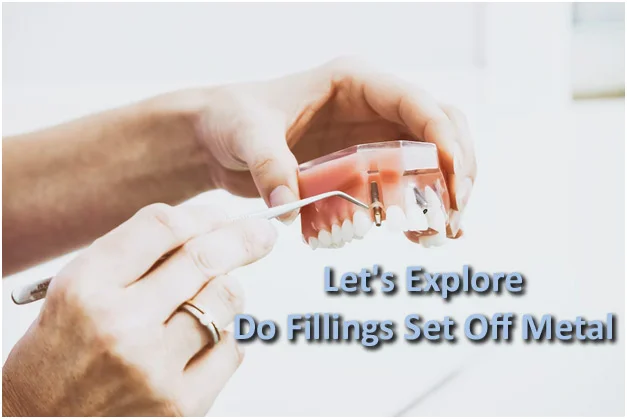Dental fillings and metal detectors may not seem like two topics that go hand in hand. However, for individuals with dental fillings, this question causes concern: Do fillings set off metal detectors?
After all, nobody wants the hassle of additional screening or delays at security checkpoints.
Therefore, addressing this common concern and clarifying the relationship between dental fillings and security screening is essential.
In this article, we aim to address the relationship between dental fillings and metal detectors.
Understanding this connection is crucial for navigating security screening without worrying or inconveniences.
By exploring the materials used, how metal detectors work, and the likelihood of fillings triggering alarms, we aim to provide clarity and help individuals confidently approach security checkpoints.
What Are Dental Fillings?
Dental fillings repair damaged or decayed teeth, restoring their natural structure and function. As a result, they prevent further deterioration and help maintain oral health.
Materials Used
Dental fillings utilize various materials, including composite resin, porcelain, ceramic, and amalgam. Composite resin, a mixture of plastic and glass particles, offers tooth-colored restorations.
Porcelain and ceramic fillings closely resemble natural teeth. Amalgam fillings, composed of metals like silver, tin, zinc, and copper, have been used traditionally.
Non-Metallic Fillings
Non-metallic fillings have gained popularity due to their aesthetics and biocompatibility. In addition, composite resin provides a natural appearance.
Porcelain and ceramic fillings offer aesthetic appeal and durability. While amalgam fillings are commonly used, modern dentistry favors non-metallic options.
How Metal Detectors Work?
Metal detectors detect the presence of metal objects by using electromagnetic fields in security screening.
Electromagnetic Fields
Why do dental fillings set of metal detectors?
Metal detectors emit electromagnetic fields that generate eddy currents in nearby metal objects.
These currents create a secondary magnetic field detected by the metal detector, alerting operators to the presence of metal.
What Can They Detect?
Metal detectors primarily detect magnetic metals like iron, nickel, and cobalt.
Non-magnetic metals like titanium, commonly used in dental implants, typically do not trigger metal detectors.
Therefore, dental fillings made from non-metallic, are unlikely to cause alarms during security screening.
Do Fillings Set off Metal Detectors?
The concern regarding dental fillings and their interaction with metal detectors is common. Many individuals wonder if their dental restorations will trigger alarms during security screenings.
Let’s explore this relationship to answer the question: do fillings set off metal detectors?
Non-metallic Fillings
Modern dentistry offers non-metallic filling options, such as composite resin, porcelain, and ceramic. These fillings are carefully designed to match teeth’ natural color and texture.
Importantly, they do not contain magnetic metals and are considered non-ferrous. As a result, non-metallic fillings are unlikely to set off metal detectors.
Minimal Metal Content In Amalgam Fillings
Amalgam fillings, historically used in dentistry, do contain metal. However, the quantity of metal present in these fillings is relatively small.
Therefore, while it is possible for an amalgam filling to trigger a metal detector, the likelihood is minimal.
The size of the filling and the sensitivity of the metal detector play crucial roles in determining if an alarm will be set off.
Small Metal Quantities and Detector Sensitivity
In rare instances, a metal filling, such as an amalgam filling, may cause a metal detector to react. However, it’s important to emphasize that this occurrence is highly unlikely.
Metal detectors are generally designed to detect larger metal objects, and the small quantity of metal in a dental filling is unlikely to trigger an alarm.
Additionally, the sensitivity of metal detectors can be adjusted to minimize false alarms caused by small metal quantities.
Security Procedures for Individuals with Dental Fillings
In the event that a metal detector alarm is triggered, security personnel are trained to handle such situations efficiently and professionally.
In addition, they understand that dental fillings are common and approach these instances with the necessary protocols.
Secondary Screening Measures
Secondary screening measures, such as handheld metal detectors or pat-down procedures, are typically employed when an alarm is triggered.
These additional checks help identify the source of the alarm without causing significant delays or inconvenience for individuals with dental fillings.
Full-body Scanners and X-ray Machines
Advanced security technologies, including full-body scanners and X-ray machines, may be utilized in certain security checkpoints.
For example, these technologies can detect dental fillings, including non-metallic restorations.
It’s important to note that dental fillings are a recognized and accepted part of oral healthcare, and security personnel are familiar with their presence during screenings.
Dental Fillings Pose No Threat To Security
It’s essential to reassure individuals with dental fillings that these restorations pose no threat to security or safety.
Dental fillings are a routine part of oral healthcare and are widely recognized by security personnel.
They understand that dental fillings are not prohibited items and can distinguish them from items of security concern.
Additional Considerations and Precautions
Misconceptions and concerns may arise regarding dental fillings and security screening.
First, however, it’s important to clarify that dental fillings, whether metallic or non-metallic, are generally unlikely to trigger metal detectors.
Understanding this can help alleviate unnecessary worries.
Communicate With Security Personnel
Effective communication with security personnel regarding your dental fillings is crucial. Discreetly inform them about your dental work to facilitate a smoother screening process.
Sharing this information creates a more efficient and stress-free experience for yourself and the security team.
Cooperate With Security Procedures
Cooperating with security procedures and adhering to screening processes is essential.
Follow the instructions provided by security personnel, maintain patience during the screening, and ensure that you are fully cooperative.
Doing so contributes to a safer and more streamlined screening environment for everyone involved.
The Bottom Line
Dental fillings are generally unlikely to trigger metal detectors during security screenings.
However, whether your fillings are metallic or non-metallic, security personnel know their presence and are prepared to handle these situations professionally.
Travel confidently, maintain good oral health, and seek professional dental advice. Finally, we hope we answered your question comprehensively: do fillings set off metal detectors?

I love all things tech, and I wear many hats – tech lover, business starter, digital marketer, and blogger. I know the ins and outs of Digital Marketing, SEO, SEM, SMM, and how to generate leads. My goal? Making things simple for you with clear guides and reviews. I stumbled upon WordPress while creating my first business site, and I fell in love with it right away. When I’m not building websites, creating content, or boosting clients’ online efforts, I’m focused on staying healthy, hanging out with family, and exploring the world. Connect with me on Facebook, Twitter, Linkedin, or read my complete biography.

